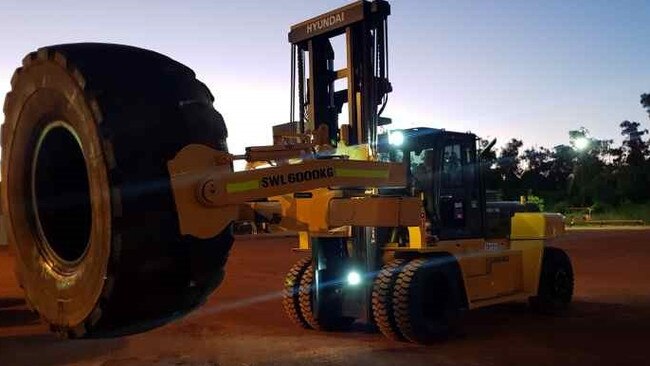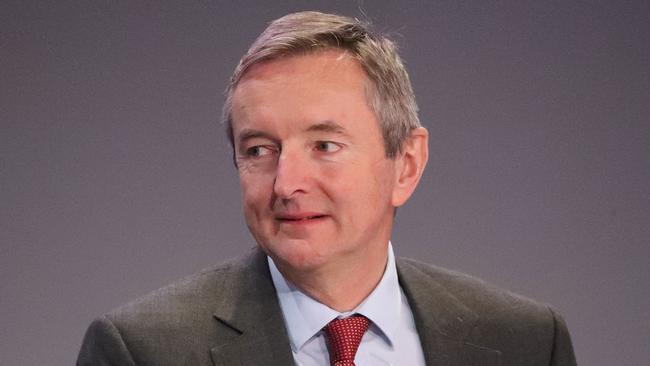Rio Tinto chairman Simon Thompson linked to carbon price pledge
Rio Tinto chairman Simon Thompson has backed a document calling for a global $US100-a-tonne carbon price.

Rio Tinto chairman Simon Thompson has backed a document calling for a global $US100-a-tonne carbon price, enough to threaten some of Rio’s Australian operations.
The call came in a coronavirus recovery roadmap distributed by the Energy Transitions Commission, a coalition of 40 global businesses including energy majors such as BP and Shell.
Mr Thompson last week put his signature to the document, which mirrors some of the so-called “green new deal” rhetoric from the political left, calling for a “massive” wave of green energy-focused stimulus measures as global governments look to reboot their own economies in the wake of the coronavirus crisis.
The document has raised eyebrows in government, business and resources circles, not least for its promotion of a $US100-a-tonne carbon price.

“Although low-carbon solutions are increasingly cost-competitive in some sectors like power and automotive, significant carbon prices, eventually reaching $US100 per tonne of CO2 or more, will be required to drive carbon emissions reduction in some of the harder to abate long-distance transport and heavy industry sectors,” the document says.
Such a price would impose significant costs to Rio’s global mining portfolio, particularly its flagship Oyu Tolgoi copper mine in Mongolia — currently powered by Chinese coal-fired power stations — and its Australian aluminium smelters, also powered by fossil fuel generators.
Rio’s flagship iron ore operations would also be likely to take a substantial cost hit, given its huge railway network runs on diesel, as do the ships carrying its ore to customers in Asia.
Rio’s Pilbara operations contributed 3.2 million tonnes of carbon equivalent emissions in 2018, suggesting such a carbon price would add billions of dollars to the company’s operating costs.
Its Pacific Aluminium smelters and mines were worth 10.3 million tonnes of carbon equivalent emissions, almost 30 per cent of Rio’s 31.8 million tonnes of total emissions.
A spokesman for Rio, which is a member of the ETC, said it did not necessarily back all the elements of the organisation’s coronavirus recovery roadmap.
“It would be a misrepresentation to suggest Rio Tinto supports every one of the ETC’s recommendations or that Rio Tinto supports a specific carbon price,” he said. “Our longstanding position is that we support market mechanisms and that we are technology agnostic.”
In 2011, Rio was a vocal opponent of the Gillard Labor government’s $23-a-tonne carbon price, with then Australian managing director David Peever arguing the tax would add about $154m a year to its costs if set at $20 a tonne.
However, that was in a period when Rio ran significant coal operations, which are now gone from the portfolio.
Rio’s latest climate change report, released in February, says that it has modelled the likely performance of its assets at a range of carbon prices, including the global $US120-a-tonne equivalent that experts say are probably necessary to keep global warming to less than 1.5C.
Rio concedes such a price, combined with other carbon abatement measures, would cut margins at its dominant iron ore division, which delivered $US17bn in underlying earnings in 2019, and threaten the viability of its two Australian aluminium smelters powered by fossil fuels.
“The potential downsides to iron ore revenues from a greater use of scrap across the steel value chain are expected to be offset by upsides for aluminium and copper — which are both essential for the electrification of the global energy system, including electric vehicles, and the deployment of low-carbon power solutions such as solar and wind,” Rio said.
“Importantly, the competitive position of our assets, both on industry cash cost and carbon intensity curves, is expected to protect the margins of our assets, even for commodities such as iron ore where we may face a negative impact on demand and price. In the case of aluminium, the attractiveness of our hydro-based assets is expected to increase relative to coal-based smelters, which would face increased carbon costs that may result in higher aluminium prices.”
Rio has said a carbon price is an “indispensable” part of any strategy to combat climate change.
It says its greatest fear about the move to a carbon price as a means of combating climate change, however, was that the same price would not be applied by all global governments, putting some of its assets at a competitive disadvantage against producers in other jurisdictions.
While Rio has set a goal of reducing its own carbon emissions by 15 per cent by 2030, from 2018 levels, it has so far resisted pressure to follow the lead of rivals such as BHP and Vale and set goals for the reduction of so-called scope 3 emissions — those attributable to customers that buy it products, rather than its own operations.
On Thursday Rio’s resistance was met with a strong backlash from institutional investors, with almost 37 per cent of votes at its annual shareholder meeting on Thursday backing a resolution calling on the company to match the promises made by its major competitors.


To join the conversation, please log in. Don't have an account? Register
Join the conversation, you are commenting as Logout